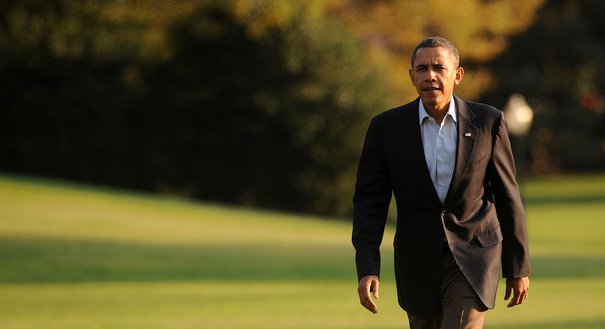For a real example of political forces engaged in the militarization of society, the Russian leadership might consider looking closer to home.
James D.J. Brown
{
"authors": [
"David Rothkopf"
],
"type": "legacyinthemedia",
"centerAffiliationAll": "",
"centers": [
"Carnegie Endowment for International Peace"
],
"collections": [],
"englishNewsletterAll": "",
"nonEnglishNewsletterAll": "",
"primaryCenter": "Carnegie Endowment for International Peace",
"programAffiliation": "",
"programs": [],
"projects": [],
"regions": [
"North America",
"United States"
],
"topics": [
"Foreign Policy"
]
}
Source: Getty
Obama’s recent characterization of his foreign policy strategy is a far cry from the soaring expectations framed by the brilliant oratory of the president’s earlier years.
Source: Foreign Policy
According to multiple reliable sources, on Air Force One during President Barack Obama's recent Asia trip, he spent some time talking with his traveling press corps about his approach to foreign policy. He was defensive and, by one account, "fuming." He felt that the criticism of his approach was unfair. He had clear ideas about how to manage America's global interests. In his own words, they centered on a single concept: "Don't do stupid shit."
In fact, after making this point, he reportedly stood up, headed forward toward his own cabin on the plane, and then stopped. He turned back to the gathered reporters, and, much like an elementary school teacher hammering rote learning into students, he said, "So what is my foreign policy?" The reporters, in unison, then said, "Don't do stupid shit."How far we have come from the audacity of hope; yes, we can; the soaring expectations framed by the brilliant oratory of the president's Cairo speech on relations with the Muslim world; his Prague speech on eliminating nuclear weapons worldwide; and his Oslo speech when accepting the Nobel Peace Prize. In fact, "don't do stupid shit" is a comedown even from his expectation-lowering remarks in the Philippines on that same Asia trip in which he limned his vision for a foreign policy that consisted mostly of "singles" and "doubles."
What's more, this aromatic, distilled essence of the Obama doctrine was not, appearances to the contrary notwithstanding, offered up in the heat of the moment. It was not a one-time manifestation of temper from the famously cool commander in chief. Last week, in a private meeting with foreign-policy columnists, he reportedly used the exact same formulation again. Mike Allen later observed in Politico's Playbook that the White House was consciously selling the idea to the media as if it were the kind of elevating notion that would lift the president's foreign policy out of the reputational ditch in which it has recently found itself.
It is, of course, the prerogative of the president of the United States to make and frame his foreign policy as he sees fit. It is among the executive's most clearly defined and potent responsibilities as described in the U.S. Constitution. So rather than getting into a lengthy discussion about how disappointing it is for this president -- who once was seen as a potentially transformational figure -- to have embraced defensive minimalism, or dwelling on the lack of imagination that has led to America's incredible shrinking foreign policy, let's take Obama's foreign policy on its own terms. Let's ask the question: Is this administration succeeding in its goal of not doing stupid shit?
This all depends, as another president might have said, on what your definition is of "stupid" and of "shit." But mostly it depends on your definition of the word "doing." Because if doing stupid shit actually requires taking an action that crosses the administration's stupidity threshold, then it would rule out all the times when not doing something was stupid. While this might be a clever way to dodge the bullet for an administration that is often criticized for its reluctance to act, this falls into the same kind of minor league Talmudic semantic contortionism that led the aforementioned prior president to parse the meaning of the word "is."
In terms of sins of commission, there is nonetheless a list of some doozies that seem to violate Obama's own new foreign-policy guidelines. The decision to double down in Afghanistan in 2009 might, for example, be seen as one of the biggest, if you measure the decision in terms of the likely benefit the United States will have gained relative to the costs it will have incurred for extending its stay and exposure. That said, while the decision was wrong, it was debatable rather than stupid. Certainly another error, equally as large, was approving the expansion of the National Security Agency's global surveillance programs. The result has damaged America's reputation, hurt relations with allies, empowered enemies, negatively impacted the environment for America's IT companies, and set back the globalizing forces of the Internet by triggering Balkanization and cybernationalism from Latin America to Europe to Asia. The relative gains from undertaking this huge, costly program (which periodically ran contrary to the spirit, if not the letter, of the U.S. Constitution and international law) certainly do not seem to have warranted the program. It was also an error that could have been avoided if more oversight of the intelligence agencies involved were in place and the president had stuck to reasonable principles of management -- or, for that matter, to reasonable principles. So if you are asking whether damaging key alliances and blowing up the Internet qualifies as stupid shit, I say yes.
Announcing the red line in Syria? Definitely stupid shit; he didn't have to say anything and shouldn't have if he didn't mean to follow through. Letting it be crossed 12 times before acting? Stupid shit. Announcing a plan to take moderate action and then withdrawing it afterward? Also stupid. Announcing support for Syrian moderates and not giving it in a timely or adequate fashion? Same. Entering Libya without a long-term plan and letting it fall into chaos immediately after the U.S. departure? Given all we know from every other intervention the United States has ever been involved with overseas, ditto. Overly focusing on core al Qaeda as terrorist franchises spread around the world as never before? More of same, mainly because it involved willful self-delusion and valuing a political message over the ground truth. Being so indecisive on Egypt that the United States had two policies at once -- one in the State Department and one in the White House? Appointing ambassadors without the credentials to do the job only because they donated money? Taunting Russian President Vladimir Putin into action with laughable sanctions? Yes, yes, yes. In each case, not only should we have known better, but there were actually people in the administration who did know better and were ignored.
To give the president and his team the benefit of the doubt, perhaps it was doing all these things that helped shape the new doctrine. Perhaps it takes time to learn stupid. One could have at least thought that until literally days after reiterating this precept to the foreign-policy journalists at lunch, the administration decided to hold a celebration on the South Lawn of the White House to congratulate itself for liberating Sgt. Bowe Bergdahl. Now, let's leave aside the argument that we don't leave our troops behind. America doesn't, and it shouldn't. And let's also leave aside the question of negotiating with terrorists. America does; others do too. Foreign policy is a messy business. These issues can also be reasonably debated. Making a hard choice that is unpopular or controversial is not necessarily doing stupid shit. Quite the contrary. It's often the job leaders must do.
But given the dubious circumstances of Bergdahl's disappearance -- widely known before the decision was made to act -- and given the fact that in the last instance of consulting with the U.S. Congress on this issue (in 2011), there was bipartisan opposition to cutting a deal and swapping Bergdahl for these terrorists, perhaps it wasn't necessary to turn it into a self-congratulatory party. Perhaps it wasn't necessary for National Security Advisor Susan Rice to say Bergdahl served with "honor and distinction." Perhaps it wasn't necessary to basically bypass Congress -- even though the law said they couldn't. Perhaps it wasn't necessary to suggest there was urgency due to Bergdahl's health when there was apparently none. Perhaps it wasn't necessary to trade all five of those really bad guys for him. Perhaps it wasn't necessary to empower the Qataris, who have been nuzzling up to extremists to America's detriment for years in places like Libya, Syria, and Egypt. Perhaps it wasn't required that the country call Bergdahl a "prisoner of war" while in the hands of the Haqqani network, as it undermines the U.S. rationale for explicitly not treating its imprisoned terrorists as prisoners of war. And in any event, it certainly wasn't necessary to do all these things at once. So this incident, too, and in some ways especially, counts as stupid shit.
It should also be noted that the release of one soldier is not a terribly big deal in the geopolitical scheme of things. But putting a handful of big-time Taliban commanders back on the battlefield as the United Stated is withdrawing is bigger. Empowering the dubiously motivated and periodically very unhelpful Qataris is bigger. Seemingly seeking a rapprochement with the Taliban and giving them a publicity victory is bigger. In short, it was not by doing this thing that Obama ended up doing stupid shit -- it was by doing it the way that he did it.
That, of course, cuts to the core of my discomfort with the White House's approach to the Bergdahl case and to its whole binary worldview that has led to these recent policy announcements.
The administration argues that the alternative to action was some opposite choice that was clearly egregiously wrong. Did you want us to leave Bergdahl behind? Did you want boots on the ground in Syria? Are we supposed to have gone to war with Russia? But no rational critic is suggesting any such thing. We are simply saying that America can do better. The country doesn't have to shoot itself in the foot, dither, offer halfway measures, fail to do necessary diplomacy, flip-flop, posture, grab for the limelight, or dissemble.
Furthermore, it is also fair to note that plenty of foreign-policy problems are not sins of commission but are the result of sins of omission, or undoing. Not acting earlier in Syria, starting the Asia pivot and not following through, too quickly withdrawing sanctions on Russia in 2009 that were put in place over the war in Georgia less than a year before, not preparing properly for global climate talks, not pushing Egypt's Mohamed Morsi hard enough to honor democracy while he was in power, not pushing the Qataris and the Turks hard enough to stop supporting the Syrian opposition, and so on.
If you take another look at the president's recent West Point speech, you will find the following line that is the G-rated cousin of Obama's self-proclaimed DDSS Doctrine: "Since World War II, some of our most costly mistakes came not from our restraint but from our willingness to rush into military adventures." While this is no doubt true in the case of the Iraq war and perhaps Vietnam, it minimizes the fact that over the period of America's ascendancy, the appropriate application of military force and the leverage associated with having an effective defense establishment have also been associated with saving the world from Nazis, fascists, and communists; with protecting allies from Europe to Asia to the Middle East; and with reducing the threat of terror. "Adventures" are always foolhardy. The use of force is not -- even if we stipulate (as we ought) that it should happen very rarely.
But, as noted earlier, the president was not really speaking of all circumstances. Instead, he was doing what he has done since the 2008 campaign: that is, presenting himself in contrast to George W. Bush and the gross missteps of his first term in office, notably in Iraq. Indeed, this focus on Not Being George W. Bush led both to the soaring rhetoric of the president's early speeches and to his conservatism later. Yes, that's right, his conservatism. Obama's doctrine is in fact the essence of conservatism. In fact, protestations of believing in American exceptionalism aside, his impulse to lean away from the world in every way except rhetorically suggests that in his heart this president may be the most prominent representative of the Rand Paul wing of the Democratic Party. And it is also, accordingly, evidence that the United States will, for the next two and a half years, have a foreign policy that is still designed to respond more to the perceived missteps of Obama's predecessor than it is to America's current and future national interests around the world.
Setting aside for a moment the president's preferred baseball metaphor, let's try another: He's in the driver's seat with one foot on the brake and his eyes firmly fixed on the rearview mirror. There is a word for that in motor sports. It's called parking.
If he sticks to this approach, we will look back on this as the moment we switched over from nearly six years of defining Obama as the un-Bush and skipped ahead to seeking to define Hillary or Jeb or whoever comes next as the un-Obama.
However, there is reason to hope that the period between last August's Syria policy debacle and this not-doing-stupid-shit moment is Obama's nadir -- and that it can only get better from here.
It was at almost this precise moment in its own eight-year tenure that the Bush administration found its second wind on the national security side, got rid of Donald Rumsfeld, gently nudged Dick Cheney to a more secondary role, and let a pretty good team help the administration finish much stronger on the foreign-policy side than it had started.
Obama could do the same if he shifts his gaze to the windshield and puts his foot on the gas. For example, his decision this week to push for new emissions regulations was instantly controversial. It was also arguably one of his very best national security moves of his time in office. It was truly leading -- not leading from behind -- on the critical issue of climate change. It will be a legacy issue that long outlives the Bergdahl controversy or the black eye caused by the gross mismanagement of the Department of Veterans Affairs. It will benefit our children and our grandchildren. And it will serve as an example to the world.
It was a bold move. It was smart shit -- a move worthy of the Obama who was seen by those of us who voted for him as a potentially transformational figure. And it was one that cast the visionless admonition that Professor Obama was trying to school into his traveling press corps in even starker terms. That lesson smacked of defeatism at a time in this presidency when this president and his predecessors have shown that there is much good that can still be done.
Carnegie does not take institutional positions on public policy issues; the views represented herein are those of the author(s) and do not necessarily reflect the views of Carnegie, its staff, or its trustees.
For a real example of political forces engaged in the militarization of society, the Russian leadership might consider looking closer to home.

James D.J. Brown
Washington and New Delhi should be proud of their putative deal. But international politics isn’t the domain of unicorns and leprechauns, and collateral damage can’t simply be wished away.

Evan A. Feigenbaum
Senior climate, finance, and mobility experts discuss how the Fund for Responding to Loss and Damage could unlock financing for climate mobility.

Alejandro Martin Rodriguez
The EU lacks leadership and strategic planning in the South Caucasus, while the United States is leading the charge. To secure its geopolitical interests, Brussels must invest in new connectivity for the region.

Zaur Shiriyev
Instead of a guaranteed ally, the Kremlin now perceives Armenia as yet another hybrid battlefield where it is fighting the West.

Mikayel Zolyan